United Methodists in Africa and the Philippines are fighting COVID-19 by making personal protective gear, raising awareness in rural areas and busy cities and breaking down myths. And they are using experiences with Ebola to stop the spread of the virus.
While Africa has had fewer cases so far, the number has now topped 10,000 in 52 countries, the World Health Organization reported on April 8. In the Philippines, WHO reported more than 3,700 confirmed cases.
Jump to story: Liberia | Congo | Philippines | Kenya | Sierra Leone | Côte d'Ivoire | Mozambique/South Africa | Nigeria | Zimbabwe
Liberian church forms taskforce to fight COVID-19
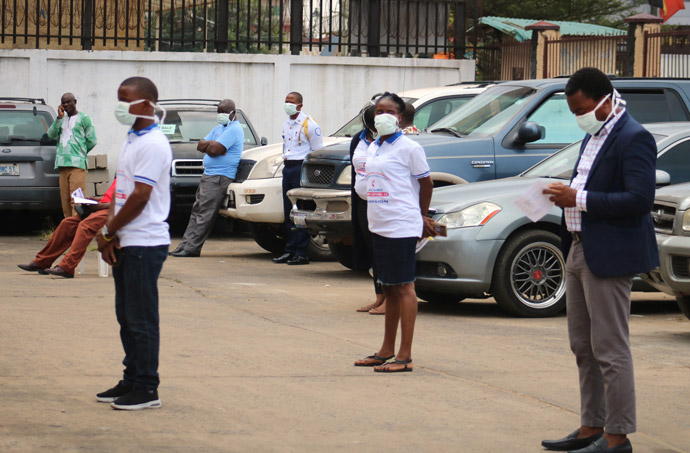
Liberia Area Bishop Samuel J. Quire Jr. urged United Methodists not to take the presence of coronavirus in the country lightly, warning it is very serious and kills more people than Ebola, which hit the West African country hard six years ago.
Speaking during the launch of the church’s Anti COVID-19 Campaign and Taskforce, the bishop challenged United Methodists to lead the country in adhering to the health protocols issued by the government. There have been 14 confirmed cases to date with three deaths.
Quire noted United Methodists were the first to suspend mass gatherings by closing schools, churches and other meeting places. He said the church is obligated to collaborate with the government in protecting people from the coronavirus.
The bishop pleaded with the business community not to make the already traumatic situation harder for the Liberian people. “Do not (hoard) the basic commodities by creating shortages and hiking prices later on,” he said.
He said most Liberians survive on daily earnings and the measures to stem the spread of the virus will create more hardships on people.
“Already, gasoline is getting scarce in Liberia,” he noted.
The church in Liberia launched its Anti COVID-19 Campaign in Monrovia on April 1. The campaign is expected to focus on the two high-risk counties of Montserrado and Margibi.
According to the chairperson of the new taskforce, Muriel V. Nelson, the campaign will include the sharing of COVID-19 information and responding to the needs of vulnerable people.
“We want to make sure our people are taken care of during these difficult times,” Nelson said.
Quire set up the taskforce in partnership with several agencies of the global United Methodist Church, including the United Methodist Committee on Relief, the Board of Higher Education and Ministry and United Methodist Communications. The campaign is expected to cost over $100,000, and the church in Liberia has contributed more than $3,000.
Jump to story: Liberia | Congo | Philippines | Kenya | Sierra Leone | Côte d'Ivoire | Mozambique/South Africa | Nigeria | Zimbabwe
As Ebola outbreak nears end, faithful gear up for new fight
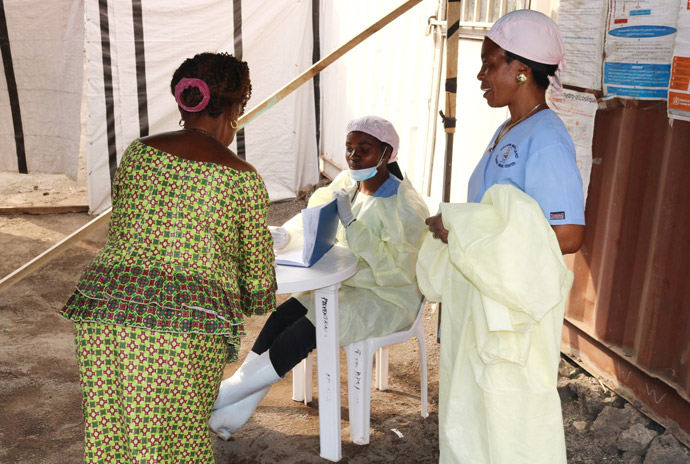
On March 24, Congo President Félix Tshisekedi closed the Congo’s borders and issued a state of emergency in an attempt to contain the spread of the coronavirus.
There have been 180 confirmed cases and 18 deaths in the Democratic Republic of Congo, according to Dr. Jean Jacques Muyembe, technical secretary of the COVID-19 Response Team. Five of the 26 provinces have reported cases.
Dr. Damas Lushima, health coordinator for the church in East Congo, said United Methodist hospitals currently don’t have the tests or trained staff to conduct on-site testing, so samples are being sent to the National Institute for Biomedical Research in Kinshasa to test for COVID-19.
East Congo Bishop Gabriel Yemba Unda said he is concerned with COVID-19 in the Beni District, the epicenter of the second-deadliest Ebola outbreak in history. There were more than 3,000 cases of Ebola in that outbreak, which began August 2018, and 2,000 deaths. The country’s last Ebola patient was discharged from a treatment center in early March, but WHO has yet to declare an end to the outbreak.
There have been two confirmed cases of COVID-19 in Beni to date.
Despite the closure of United Methodist churches, the communications department has started to raise awareness about preventive measures against the coronavirus, said Judith Osongo Yanga, communications director in East Congo.
The bishop said he is working with pastors and communicators of the annual conferences and districts to convey messages of awareness at the community level.
Lushima said the United Methodist Board of Global Ministries’ Global Health unit is offering emergency grants, up to $10,000 USD, to cover training costs.
“After 30 days, a post-training survey will assess the retention of knowledge of trainers and participants. This will help each episcopal area to carry out the first actions and see the effectiveness,” he said.
Jump to story: Liberia | Congo | Philippines | Kenya | Sierra Leone | Côte d'Ivoire | Mozambique/South Africa | Nigeria | Zimbabwe
Providing face shields, food in the Philippines
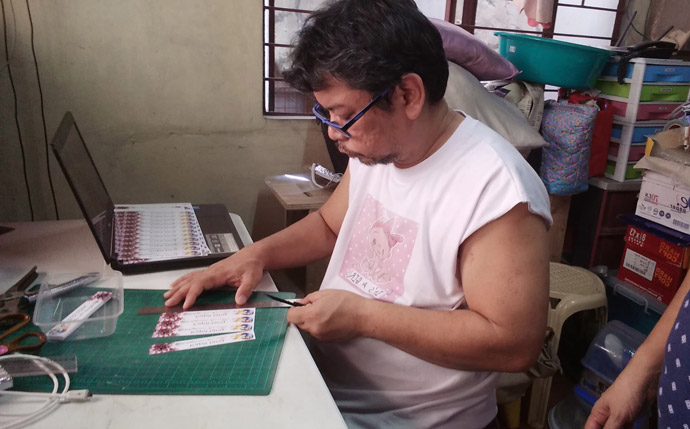
As the Philippines deals with the socio-economic and political toll brought by the pandemic, United Methodists addressed the global scarcity of protective gear, food and emotional support.
Melvin Nor S. Ramos, a layperson from Kawan ni Kristo United Methodist Church in the South Bulacan District, helped create “do it yourself” face shields. Together with his family and other church members, he pooled resources to create the needed protection.
“We were able to do hundreds of face shields —120 pieces were donated to the Philippine General Hospital in Manila, 20 pieces to the Rural Health Unit in Obando Bulacan, and five pieces to each neighbor household and friends,” Ramos said.
“It was (during) lockdown (so) no materials were available, but church members responded to contribute their available materials.”
There have been more than 3,700 confirmed coronavirus cases in the Philippines and 177 deaths. The main island of Luzon is on lockdown until April 30.
The Rev. Antonio P. Pacheco, administrative pastor of Tagumbao United Methodist Church in Gerona, under the Central Luzon District, has focused on providing food.
“Our church’s goal is to extend help to poor and needy people in our community during the duration of the lockdown by giving food supplies like rice, vegetables and grocery items,” he said. “It is an act of expressing our faith and love to God and our love to our neighbors,” he said.
In Kidapawan City in North Cotabato, a group of students and a dean from Southern Philippines Methodist College Inc. went with Bishop Rodolfo A. Juan to visit the Philippine National Police, the Armed Forces and volunteers with the Department of Health. The students brought food and coffee and took the temperatures of pedestrians and motorists at a checkpoint in Kidapawan City.
“They brought balinghoy, a native delicacy made out of sweet potato, which students themselves prepared. I prayed for them (policemen and military) for protection, good health and for commitment to their duties,” Juan said.
“Let us be prayerful, patient and persevering during this time of global crisis. Let us help by staying at home, and in any way extend support to the front-liners.”
Jump to story: Liberia | Congo | Philippines | Kenya | Sierra Leone | Côte d'Ivoire | Mozambique/South Africa | Nigeria | Zimbabwe
Kenya-Ethiopia Conference responds to crisis
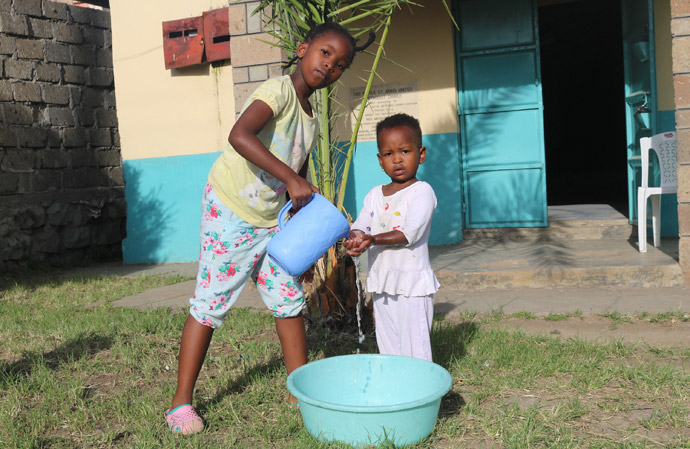
The Kenya-Ethiopia Conference is assisting efforts to contain COVID-19 by providing special guidelines to its worshippers, which include skipping traditional Eastertime travels.
In mid-March, the government suspended all public gatherings, schools, sporting events and open-air religious meetings. Churches are now leading services on social media platforms such as Facebook.
There have been 142 confirmed coronavirus cases and four deaths in Kenya.
As infection rates and death tolls began to rise, churches have urged members to stay safe by encouraging the use of soap, hand sanitizer, masks and non-contact thermometers.
“We know that some of these measures will interrupt our customs as Kenyans, but it is necessary to take them given the high risk our hesitation may expose us all,” said the Rev. Kephas Oloo, superintendent of the Nyanza District.
The Rev. Wilton Odongo said the coronavirus disproportionately affects the vulnerable and the churches that care for them.
“We appeal for funding to help churches continue the important work they are doing,” said Odongo, conference secretary to the East Africa Episcopal Area and Nairobi District superintendent.
“It will take much preparedness as we switch to delivering Sunday services to mass audiences online amid social distancing efforts to tackle the coronavirus. This pandemic has reminded us of our very fundamental foundation of reviving our family churches across the globe.
“Using social media, the churches can connect and maintain congregational and community relationships during this time of challenge,” Odongo said.
The conference is calling for donations to support its churches in their response to the COVID-19 pandemic, especially health services in remote communities and lifesaving equipment such as soap, hand sanitizer and protective clothing, Odongo said.
Jump to story: Liberia | Congo | Philippines | Kenya | Sierra Leone | Côte d'Ivoire | Mozambique/South Africa | Nigeria | Zimbabwe
In Sierra Leone, church takes coronavirus fight to the streets
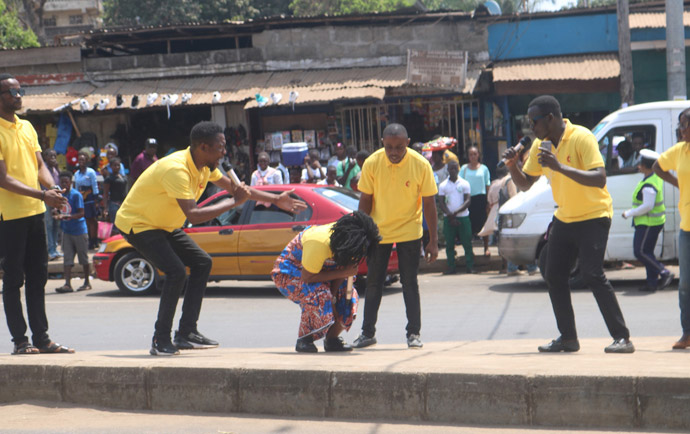
As they did during the Ebola outbreak, United Methodists in Sierra Leone are using drama, jingles and songs to educate people about the coronavirus.
A week before the first case was recorded in the country on March 31, a group of mainly young volunteers hit the streets to share information about COVID-19.
There are now six confirmed cases in the country and 311 people have been quarantined.
The campaign — sponsored by the Missions and Development Department of the Sierra Leone Conference — was aimed at preparedness, prevention, control and dismissing denials and myths about the pandemic that has now infected over 1.4 million people and killed more than 81,000 worldwide.
Health authorities have struggled to counter misinformation about the pandemic, most of which comes from social media.
“We are being told that coronavirus does not infect people living in hot regions. The pandemic is now in our two neighboring countries: Liberia and Guinea. Like Sierra Leone, both Liberia and Guinea are hot. Let us take the precautionary health measures seriously,” said one of the several speakers on the mounted public-address system as the campaign vehicles traveled down the streets of Freetown.
“Contrary to fake news, coronavirus can infect and kill black people. Before now, it was in China, Europe and America. Now, it is in Africa and … it is infecting and killing blacks every day. Don’t believe news on social media. Listen to messages from the World Health Organization and the health ministry,” another speaker said.
The government has suspended flights to and from Sierra Leone and closed all schools.
The Council of Churches in Sierra Leone, headed by United Methodist Bishop John K. Yambasu, issued a press release March 24 calling on Sierra Leoneans to draw from their strength in fighting Ebola to defeat the coronavirus.
The statement also urged United Methodists to observe the prescribed preventive measures for the continued safety of the entire nation, including no worship service in churches until further notice and no weddings and funerals in religious places.
Yambasu asked all conference staff to stay home until further notice and warned that staff salaries might be affected if “things get worse.”
On March 5, the bishop delivered a nationwide Palm Sunday TV message on coronavirus containment themed “Don’t Be Afraid” with text from II Chronicles 7:14.
“With the virus already causing massive devastations in the world’s most powerful nations, there is little hope left for third-world countries like Sierra Leone, where the virus has shown its ugly head,” the bishop said. “But I have good news for you. When the devil closes a window, God opens a door.”
Yambasu said the coronavirus has provided opportunities for families to worship together.
“Only the physical church has been closed, but the spiritual church remains wide open. And we are the church because my Bible tells me that we are the temple of God,” he said.
Jump to story: Liberia | Congo | Philippines | Kenya | Sierra Leone | Côte d'Ivoire | Mozambique/South Africa | Nigeria | Zimbabwe
Côte d'Ivoire church spreads messages of hope amid crisis
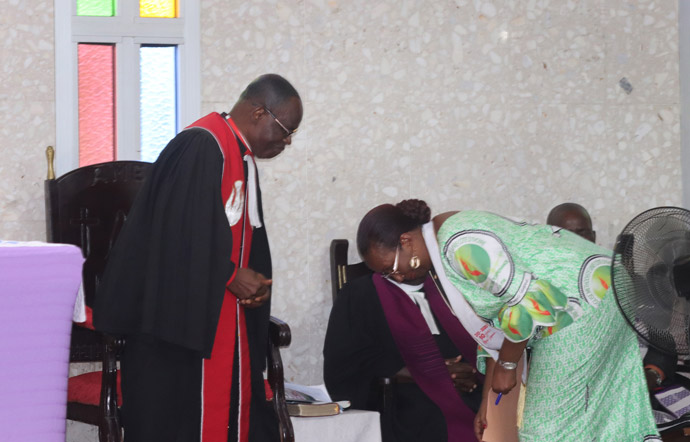
In Côte d'Ivoire, gatherings of 50 people or more are banned and schools closed. Residents are not confined to their homes, but the government has urged caution when traveling.
There have been 323 confirmed cases of coronavirus and three deaths in the country.
On March 17, the Côte d'Ivoire Conference of The United Methodist Church closed all temples and suspended all church activities until further notice. However, Bishop Benjamin Boni encouraged families to hold their own services at home.
The number of online worship services have multiplied and funeral ceremonies are being organized in the strictest family intimacy — usually with only a pastor, his assistant, four choir members and less than 10 family members.
The church is using social networks, its Voice of Hope radio station and programs on national television as its main channels of awareness and communication.
The Voice of Hope, which recently celebrated its 10th anniversary, is sharing government and conference best practices to help stop the spread of the virus. Sermons of hope and other programs are being broadcast to pray for the situation and those suffering.
Since churches are closed, Voice of Hope has become a “virtual temple,” said Lydie Acquah, director of the radio station.
Jump to story: Liberia | Congo | Philippines | Kenya | Sierra Leone | Côte d'Ivoire | Mozambique/South Africa | Nigeria | Zimbabwe
Helping members worship at home in Mozambique, South Africa
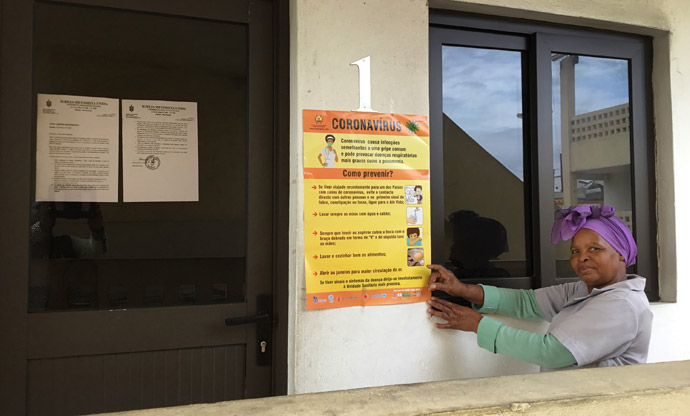
The United Methodist Church in Mozambique has closed church gatherings, seminars, Bible studies, schools and universities. In some cases, students are taking online classes.
As of April 7, Mozambique had 10 reported COVID-19 cases and hundreds of people were in quarantine due to travel outside the country or contact with infected people.
The episcopal office is sending daily biblical readings for at-home devotions. Clergy are also urged to share audio or video homilies with their congregants and to reach out via phone calls or text messages.
In South Africa, which is among the hardest-hit countries on the continent, citizens are entering their second week of a 21-day lockdown. The number of confirmed cases there increased to 1,749 on April 7, with 13 deaths.
Congregations in South Africa are using WhatsApp and Facebook to facilitate communication and receive sermons and other important messages.
The Rev. Thabiso Letuka, director of connectional ministries and pastor of a congregation in the village of Eastern Cape, said there are definitely challenges to connecting with church members.
“They are used to a traditional way of worshipping, so this time around, things are not going to be easy. The majority of our members here are unemployed. Getting airtime for them to be connected and (working with technology) is not going to be easy because everything here costs money.”
Jump to story: Liberia | Congo | Philippines | Kenya | Sierra Leone | Côte d'Ivoire | Mozambique/South Africa | Nigeria | Zimbabwe
Nigerians reach out to rural communities
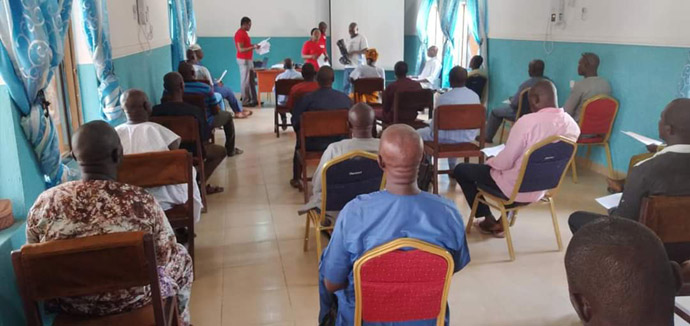
The first case of COVID-19 was confirmed in Nigeria in early March in Lagos. Now, there are over 238 confirmed cases in the country and five deaths.
The government has declared a lockdown in the economic hub of Lagos and the capital city Abuja, ordering the closure of all public places including churches and mosques.
United Methodist Bishop John Wesley Yohanna issued a statement calling on pastors to suspend all Sunday services, midweek prayers, conferences and meetings until further notice. He instructed all pastors to adhere to social distancing while finding alternative ways to connect with congregations.
“The COVID-19 pandemic is a reality. It has continued to threaten our common existence as human beings. As the church, we have to join efforts with the rest of the world to stop the spread of this virus,” Yohanna said.
United Methodist pastors in Nigeria are using Facebook Live, WhatsApp, Messenger, Skype and Zoom video calls to hold services and meetings to stay connected with members. In areas where there is no internet access, pastors are using SMS messaging and phone calls to reach out.
Yohanna said the church’s Rural Health Department is working to raise awareness about the virus in rural communities and to provide hand sanitizer and handwashing basins.
Jump to story: Liberia | Congo | Philippines | Kenya | Sierra Leone | Côte d'Ivoire | Mozambique/South Africa | Nigeria | Zimbabwe
Zimbabweans rethink church during pandemic
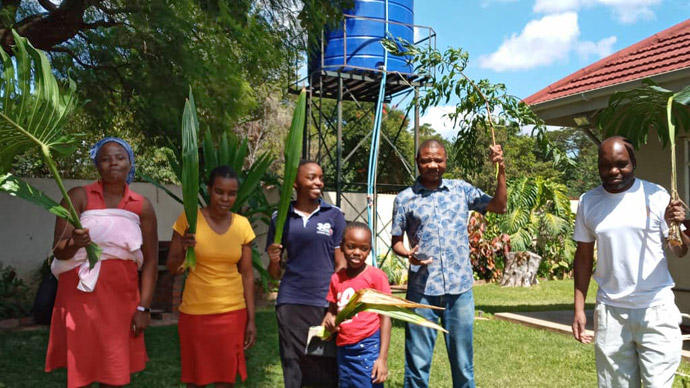
Traditionally, United Methodists parade through the streets carrying palms on Palm Sunday. Communities would also typically see Christians marching in the early morning on Easter Sunday singing praises of victory.
That’s all changed due to the coronavirus pandemic. Zimbabwe is on 21 days of lockdown and everyone is expected to stay at home. As of April 8, Zimbabwe has confirmed 11 cases and two deaths.
Prior to the lockdown, The United Methodist Church suspended all activities in Zimbabwe from March 24 in an effort to help curb the spread of the novel coronavirus.
Bishop Eben K. Nhiwatiwa said in a statement that in consultation with other leaders, the church suspended all church gatherings until further notice.
The Rev. Alan Gurupira, administrative assistant to the bishop, reminded all pastors that they are on call as always.
“Continue to shepherd the flock by means of making good use of technology to reach members with words of comfort,” he said.
The Rev. Gift Machinga, Zimbabwe East Conference Board of Discipleship chairman and Cranborne United Methodist Church senior pastor, said the church is feeling the impact.
“By nature, the church is an institution that traditionally meet physically for worship,” he said.
The inability to meet physically calls for churches to adopt alternative methods to remain relevant.
The Rev. Sophrins Sign, Zimbabwe East connectional ministries director, explained that the church’s doors may be closed, but church activities are continuing in isolation.
“Members are conducting services in their homes and, as for the areas where some families cannot be reached through WhatsApp or SMS text messaging, pastors are improvising or finding best ways to communicate with their people,” Sign said.
Despite all odds, Palm Sunday was observed in different ways. Families decorated their homes and gates with palms and tree branches and sang “Hosanna” as they marched around their homes waving branches.
Meanwhile, Cranborne United Methodist Church is continuing to feed members spiritually despite the restrictions. Before the coronavirus epidemic, the church livestreamed services every week on Facebook.
“I predicted the lockdown coming and started putting things together. All sermon recordings were done by March 29,” Machinga said. “We already have pre-recorded worship services up to April 19, a period covering more than the pronounced 21 days. This includes all the Holy Week and Easter services."
Machinga called pastors to uplift the flock spiritually and encourage social support during this time of fear, panic, anxiety and hopelessness.
“We can encourage our congregants to create space in their homes and be in a position to feel God's presence, thereby, keeping hope alive,” Machinga said. “Our primary responsibility is to be in the trenches ensuring safety and protecting the welfare of our flock.”
Jump to story: Liberia | Congo | Philippines | Kenya | Sierra Leone | Côte d'Ivoire | Mozambique/South Africa | Nigeria | Zimbabwe
This story was compiled by Julie Dwyer, UM News assistant news editor, with reporting by communicators E Julu Swen in Liberia, Philippe Kituka Lolonga in the Kivu Conference of Congo, Gladys P. Mangiduyos in the Philippines, Gad Maiga in Kenya, Phileas Jusu in Sierra Leone, Isaac Broune in Côte d’Ivoire, Joao Filimone Sambo in Mozambique, Nandipha Mkwalo in South Africa, the Rev. Ande Emmanuel in Nigeria and Priscilla Muzerengwa in Zimbabwe.
News media contact: Vicki Brown, news editor, newsdesk@umcom.org or 615-742-5469. To read more United Methodist news, subscribe to the free Daily or Weekly Digests.
Like what you're reading? Support the ministry of UM News! Your support ensures the latest denominational news, dynamic stories and informative articles will continue to connect our global community. Make a tax-deductible donation at ResourceUMC.org/GiveUMCom.



